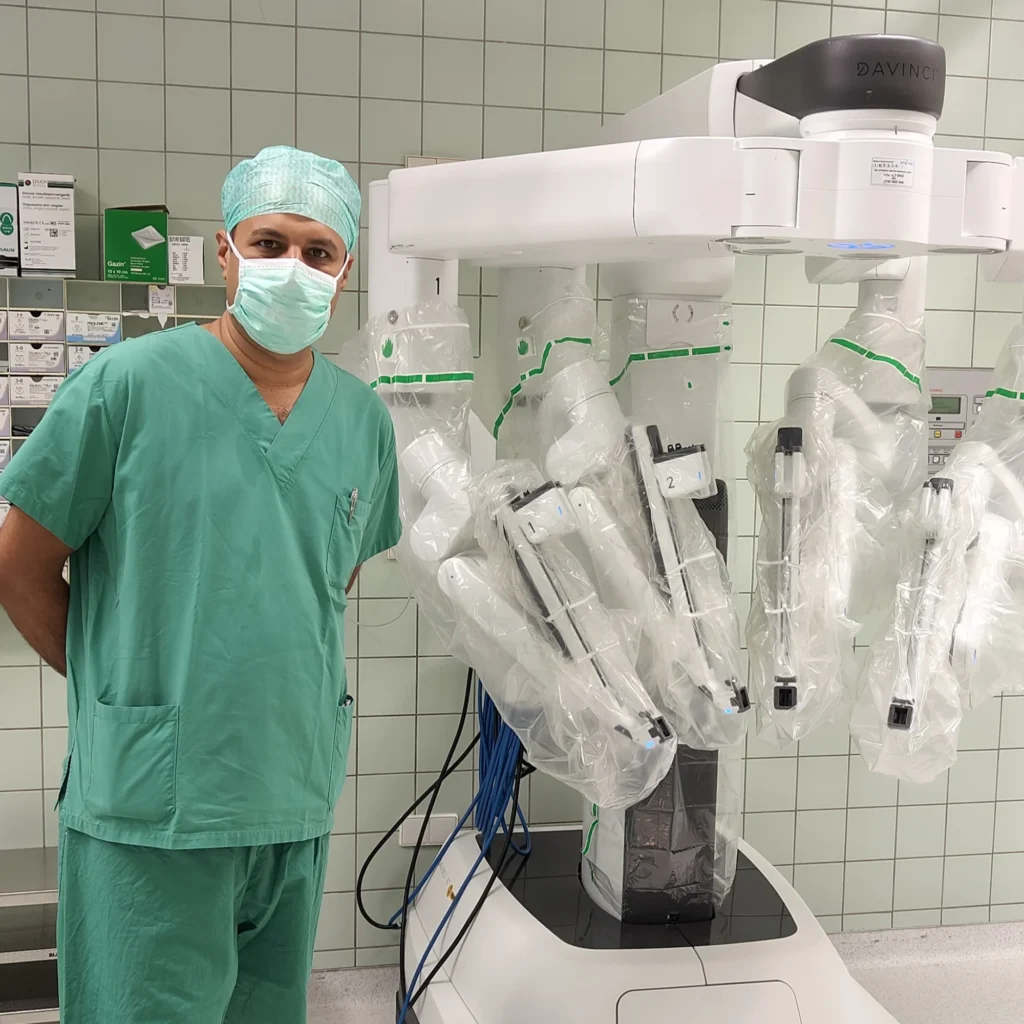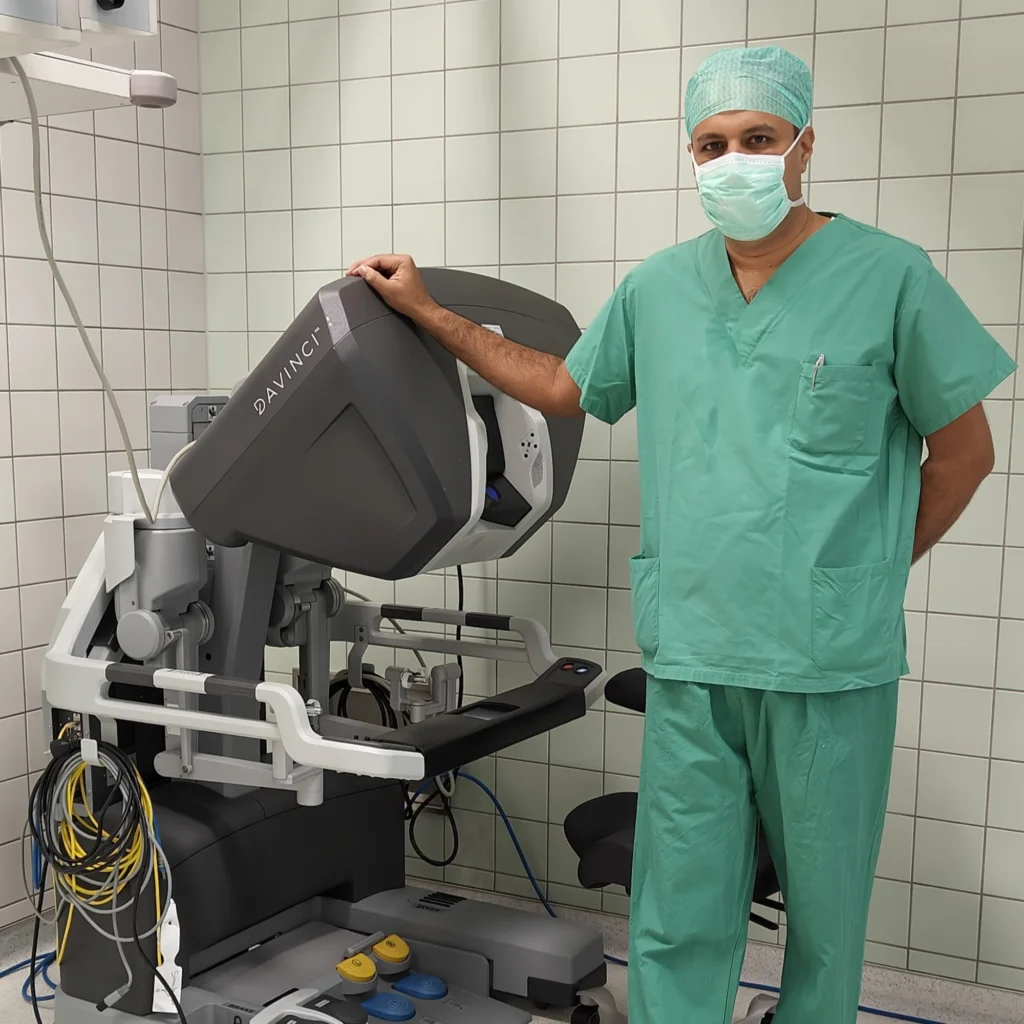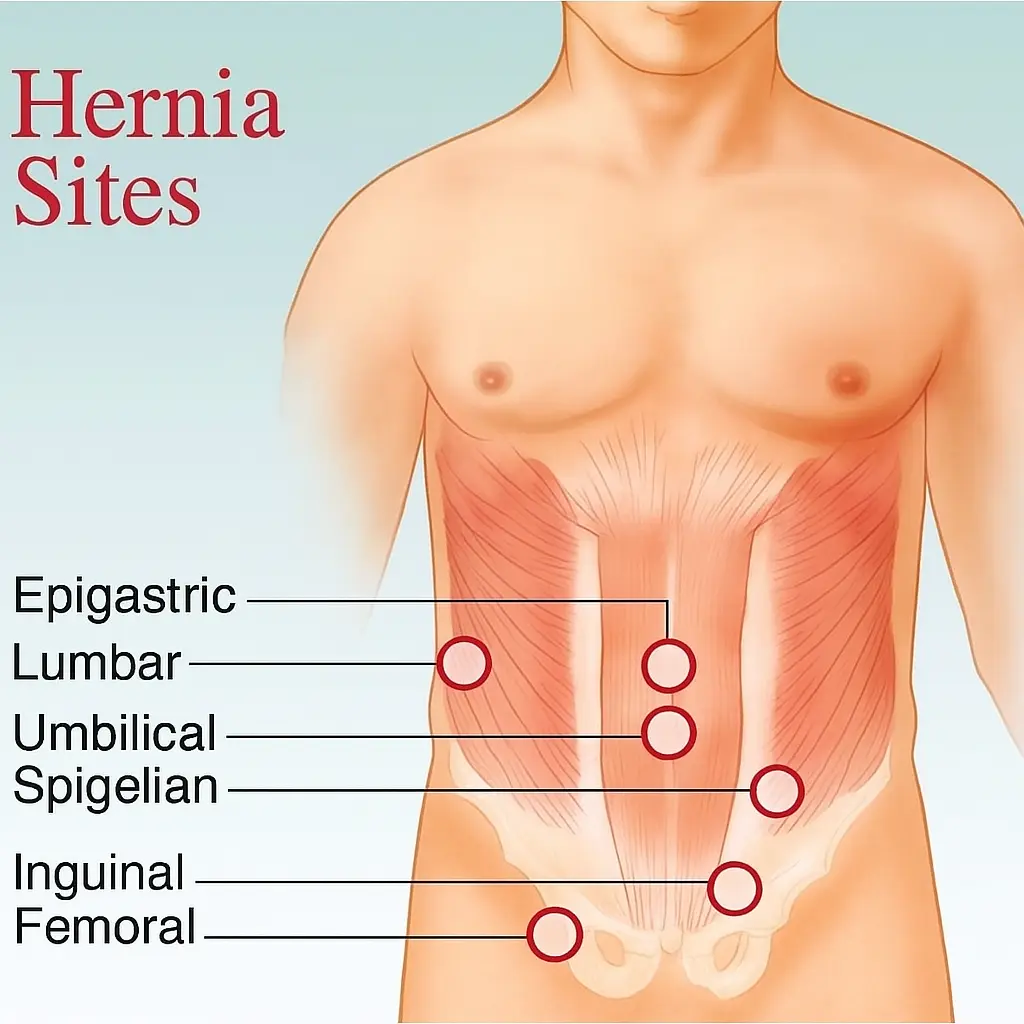Namaste friends, I am Dr. Kedar Patil, a Robotic Bariatric and Advanced Laparoscopic Surgeon practising at Precise Clinic in Pune. Many people feel that in robotic surgery, robots operate on you. But in reality, it is not so.
With years of experience in robotic surgical procedures, I would like to share with you comprehensive information about robotic hernia surgery and why this advanced surgical technique is transforming the way we approach hernia repair in India.
When patients hear the term “robotic surgery,” they often have a misconception that the operation is performed entirely by a robot. I want to clarify that this is not the case.
Robotic hernia surgery is actually a robot-assisted surgical procedure, where the surgeon controls the robotic system to operate with enhanced precision and control.
Just as I explained in my previous discussions about robotic surgery, this advanced technique represents a significant evolution in our surgical field compared to traditional laparoscopic surgery.
The robotic system allows us to repair hernias with unprecedented accuracy, especially in complex cases where traditional methods may present challenges.
The robotic surgical system consists of three essential components that work together seamlessly:
Patient Cart: This is positioned beside the patient during surgery. The robotic arms and instruments are docked through small ports made in the abdomen. These instruments replicate the surgeon’s movements with enhanced precision and seven degrees of movement, compared to the four degrees of movement in laparoscopic surgery.
Surgical Console: This is where I sit during the operation, controlling the robotic instruments through a 3D magnified vision system. Every movement I make is translated into the robotic arms, which feature enhanced dexterity and tremor elimination.
Vision Cart: This houses the visual instruments and energy devices. My assistant surgeons and nursing staff use this to monitor the procedure and provide necessary support, including instrument exchange when required.
During robotic hernia surgery, the abdomen is inflated with carbon dioxide gas to create working space. As a surgeon, I operate from a console using 3D magnified vision while robotic arms perform precise movements through small ports. The surgical team assists me by monitoring the procedure on screens and changing instruments as needed.


Based on my extensive experience with robotic procedures, I have observed several significant advantages that make robotic hernia repair particularly beneficial for Indian patients:
The 3D magnification and improved vision capabilities allow me to see minute details during the hernia repair. This enhanced visualisation means I can clearly identify blood vessels, preserve healthy tissue, and operate only on the necessary areas. The result is minimal tissue handling and reduced blood loss during the procedure.
Hernias often occur in areas where the body’s structure is narrow or confined. The seven degrees of movement provided by robotic instruments make surgery much more manageable in these restricted spaces, such as the food pipe, esophagus, liver, stomach, pancreas, spleen, and liver. This is particularly advantageous for complex hernia repairs in the inguinal region, ventral hernias, and hiatal hernias.
One of the most significant advantages I have experienced is the elimination of tremors. When performing delicate suturing during hernia repair, the robotic system eliminates any hand tremors, making the procedure as precise as if the hernia were directly in front of me. This leads to superior mesh placement and more substantial repairs.
The Indocyanine Green (ICG) fluorescence technology has become a game-changer in hernia surgery, particularly in complex cases. When ICG dye is injected, I can clearly visualise blood vessels and identify the exact anatomy.
The comfort of the surgeon is of utmost importance when operating for long hours especially in complex hernias. With robotic surgery, we can manage comfortably from a seated position. The camera control is in the hands of the surgeon rather than an assistant, so as a surgeon, I have complete control over it and can zoom in and out whenever required. The total mental peace, combined with ergonomic position, leads to better patient outcomes.
In robotic surgery, continuous data collection is made of the movements made by the instruments. This data is made available to us, allowing us to make improvements in surgical technique in real-time with minimal manipulation of organs and instruments. This adds to our surgical precision.
For Indian families considering hernia surgery, the benefits extend beyond the technical advantages:
Due to minimal tissue handling and reduced trauma, patients experience less post-operative pain. The bowel function returns to normal earlier, allowing patients to resume their regular diet and activities sooner. This is particularly important for working professionals who need to return to their responsibilities quickly.
Most patients undergoing robotic hernia repair can be discharged earlier than those undergoing traditional open surgery. This reduces the overall burden on the family and allows patients to recover in the comfort of their homes.
The small incisions required for robotic surgery result in minimal scarring, which is especially appreciated by younger patients and those concerned about their cosmetic appearance.
The precision of robotic surgery significantly reduces the risk of complications such as infection, bleeding, and hernia recurrence. This provides peace of mind to patients and their families.
The precision of robotic surgery significantly reduces the risk of complications such as infection, bleeding, and hernia recurrence. This provides peace of mind to patients and their families.
Based on my experience, robotic hernia surgery is particularly effective for:
During our consultation, I conduct a thorough examination and discuss your medical history with you and your family members. We review the benefits and address any concerns you may have about the robotic approach. I believe in involving the entire family in decision-making, as this is an important aspect of Indian healthcare culture.
On the day of surgery, you will be positioned comfortably while I control the robotic system from the console. The procedure typically takes 1 to 2 hours, depending on the complexity of your hernia.
Throughout the surgery, I maintain complete control over the robotic instruments while monitoring your progress through high-definition 3D vision.

Post-operative care is designed to ensure your comfort and rapid recovery. Most patients can return to light activities within a few days and resume normal activities within 2-3 weeks, depending on the nature of their work and family responsibilities.
I understand that cost is an important consideration for Indian families. While robotic hernia surgery may involve a higher initial investment compared to laparoscopic surgery, it is essential to view this as an investment in your long-term health and well-being.
The benefits of faster recovery, reduced complications, and superior outcomes often offset the initial cost difference. Many patients find that the reduced time away from work and lower risk of recurrence make robotic surgery economically beneficial in the long term.
We also offer flexible payment options and collaborate with various insurance providers to make this advanced treatment more accessible to families.
Our facility is equipped with state-of-the-art robotic surgical technology and staffed by trained professionals who specialise in robotic procedures.
The continuous data collection feature of our robotic system allows for constant improvement in surgical technique, ensuring that each procedure is performed with optimal precision.
As a surgeon, I find that the ergonomic advantages of robotic surgery allow me to perform longer, more complex procedures with sustained precision, ultimately benefiting patient outcomes.
When considering hernia surgery options, it is essential to consult with an experienced robotic surgeon who can assess your specific condition and recommend the most suitable approach.
Every patient’s situation is unique, and therefore we make a decision based on your medical condition, lifestyle requirements and family circumstances.
As patients, please discuss all your concerns with us during your visit. This can help you understand the procedure, clear up any doubts, and set expectations, allowing you to make better and more informed decisions.
Robotic surgery represents the present and future of surgical care. This technique is a boon for hernia patients, offering enhanced surgical capabilities and improved surgical outcomes.
The investment in robotic surgical technology reflects our commitment to providing the highest standard of care to our patients and their families.
As more surgeons adopt this technology and more patients experience its benefits, robotic hernia surgery is becoming the preferred choice for many families across India.
If you or a family member is dealing with a hernia and would like to explore whether robotic surgery is the right option, I encourage you to schedule a consultation.
Together, we can determine the best approach for your specific situation and ensure that you receive the highest quality care possible.
Thank you for taking the time to learn about robotic hernia surgery. I look forward to serving your healthcare needs and those of your family. Please don’t hesitate to contact me if you have any questions.